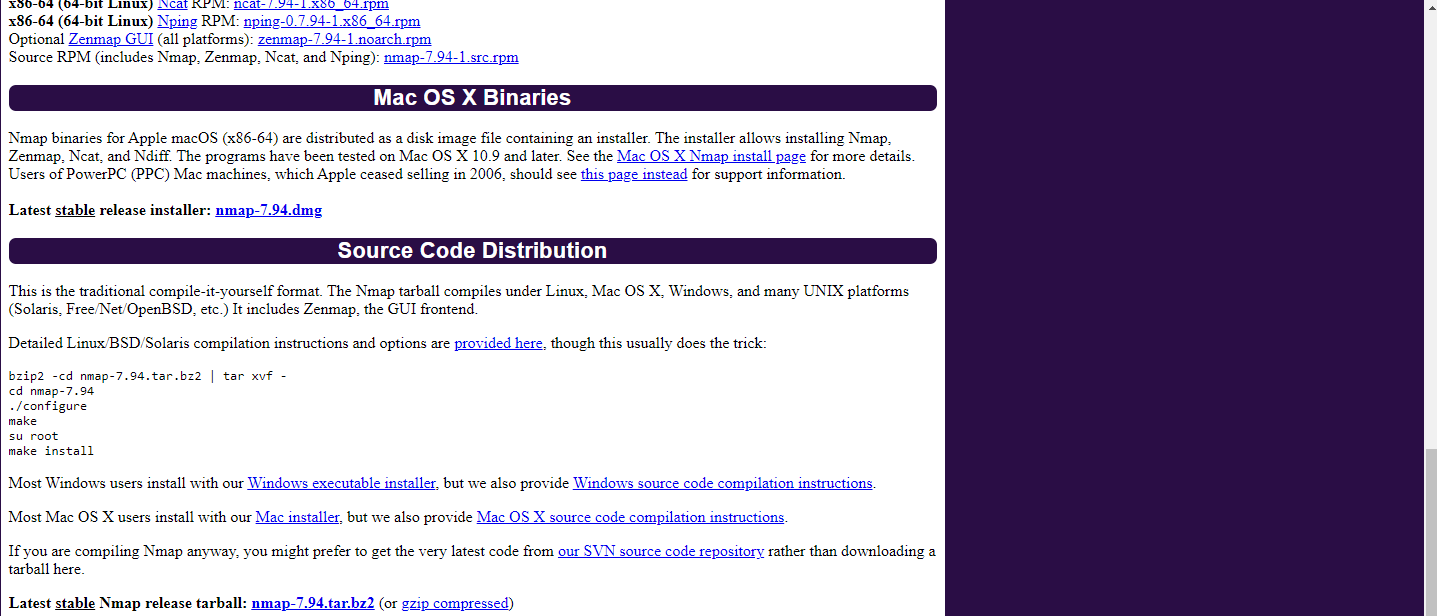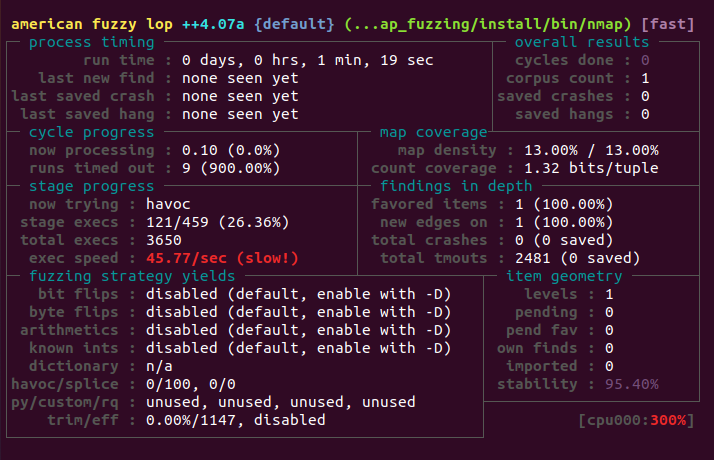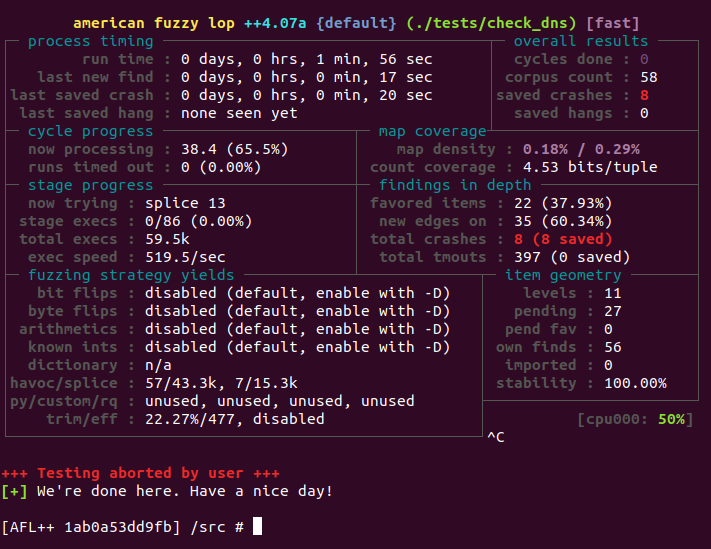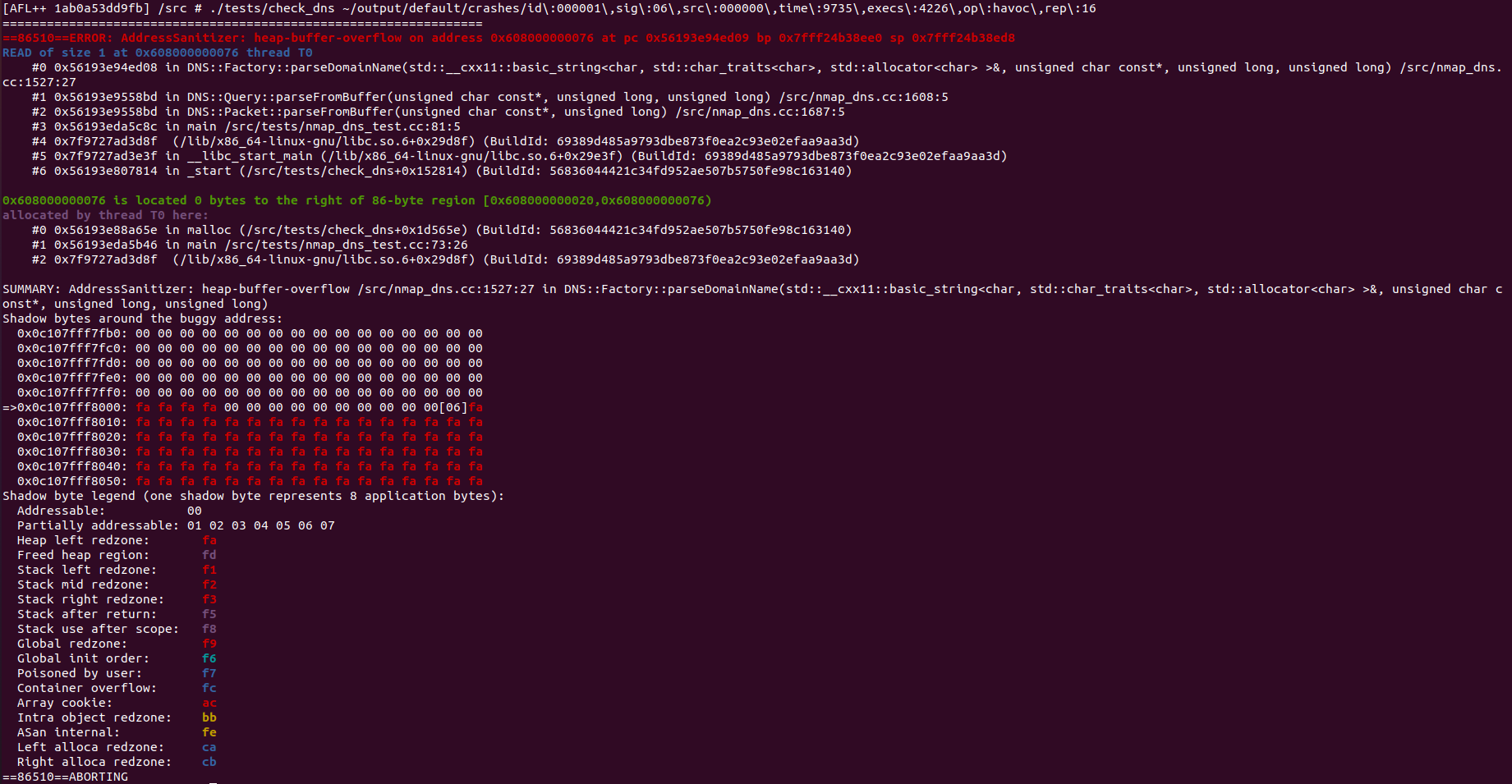Fuzzing NMAP with AFL++
by Tomer Goldschmidt
I’ve been wanting to research a common utility software for a long time. I figured I might as well try researching something I had somewhat of an experience working with.
After some thought, I decided looking into nmap.
At first I wanted to open the binary in ghidra and start analyzing, but before delving into binary reverse engineering I googled if anyone did something like this before.
I found an article explaining about fuzzing the utility nmap. It sounded like a great opportunity to give fuzzing with AFL++ a go.
Getting AFL++
user@ubuntu:~$ sudo docker pull aflplusplus/aflplusplus
Reproducing Article Results
First thing I thought might be beneficial for me was to reproduce the results from the Article, and to see for myself what happens.
The following describes the steps I took to reproduce the results:
-
Downloaded sources for
nmapfrom https://nmap.org/download.html
- Started the
AFL++docker and started prepping for fuzzing sessionuser@ubuntu:~/fuzzin-nmap/nmap-src/$ docker run -ti -v `pwd`:/src aflplusplus/aflplusplus - Configured the
nmapproject as described in the article usingAFL++ clangcompilers[AFL++ 1ab0a53dd9fb] /src # AFL_USE_ASAN=1 CC=`which afl-clang-fast` CXX=`which afl-clang-fast++` ./configure --prefix="$HOME/nmap_fuzzing/install/" - Used the
makeutility to build the project with my configuration.[AFL++ 403c784b2306] ~ # AFL_USE_ASAN=1 make && AFL_USE_ASAN=1 make install - Started A fuzzing session.
[AFL++ 403c784b2306] ~ # afl-fuzz -m none -i ~/corpus/ -o ~/output -s 999 -- ~/nmap_fuzzing/install/bin/nmap 127.0.0.1 -p 80 --script @@

After some time letting the session go, I stopped it with the understanding that its not so optimal. The author of the article even presented his conclusions for his demonstration. One of which, to make the fuzzing more focused.
My Conclusion
Making a fuzzing session on plainly running nmap was a bit naïve. nmap has the lua scripting engine built-in to evaluate nse scripts. This makes it unreasonable for me to test this particular area of the software. With that I concluded that i need pivot my fuzzing effort in to a different area of the software.
Testing Packet Parsing Capability
Another option I had for testing nmap was testing its packet parsing capability. Apparently nmap has a module in the tests folder that is used for testing the tool. So I decided to try fuzzing this target and see what might pop up while fuzzing.
But before starting to fuzz this sample, I needed to tweak the test module a little bit. Specifically removing its network querying functionality.
I did this because I only wanted to test the parsing of response packets.
My edit results for src/tests/nmap_dns_test.cc:
#include "../nmap_dns.h"
#include <fcntl.h>
#include <unistd.h>
#include <stdlib.h>
int main(int argc, char **argv)
{
int fd = open(argv[1], O_RDONLY);
struct stat st;
fstat(fd, &st);
long int sz = st.st_size;
u8 *answer_buf = (u8 *)malloc(st.st_size);
DNS::Packet p;
if (sz != read(fd, answer_buf, sz))
{
free(answer_buf);
return -1;
}
p.parseFromBuffer(answer_buf, sz);
free((void *)answer_buf);
return 0; // 0 means ok
}
[AFL++ 403c784b2306] /src # apt install libssh-dev
[AFL++ 403c784b2306] /src # AFL_USE_ASAN=1 make
[AFL++ 403c784b2306] /src # AFL_USE_ASAN=1 make tests/check_dns
[AFL++ 403c784b2306] /src # afl-fuzz -m none -i ~/corpus/ -o ~/output -s 999 -- ./tests/check_dns @@
Seemingly I get some crashes, but I am doubtful this means a bug/vulnerability.

Triaging
Looking at the crash results with my fuzzing setup I can see that some kind of Heap-Overflow has occurred.
Below is the prompt when running the instrumented check_dns binary with the crash input:

When testing this crash sample on a clean variation of check_dns on my host machine, it seems that the program doesn’t crash.
- I did notice that I get a traceback with the function that causes the crash.
DNS::Query::parseFromBuffer(...)is the place where the overflow allegedly occurs. Specifically in/src/nmap_dns.cc:1527:27.
Root Cause Analysis
After some reading I figured out that the issue in this case is an issue of reading beyond the bounds of the allocated buffer on the heap. This might cause issues in the program. In my case it did not cause any significant effect on the program I used for fuzzing.
Summary
I wanted to finish this post about now, with the intention of investigating and researching more. I think that writing this blog post helped me a lot in gathering more experience with fuzzing. Specifically with AFL++. Thank you for reading this post, I hope that it was informative and fun for you readers.